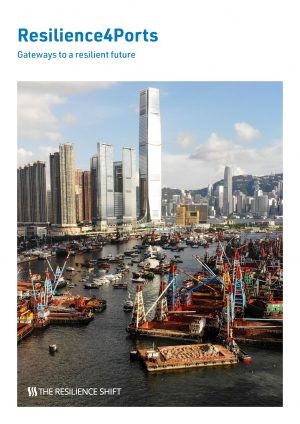The multiple drivers of change currently facing ports require a whole-systems approach before low-carbon, resilient ports transformations can be realised says a new report from The Resilience Shift. See headline findings.
Launched in July 2020, the project brought together over 30 organisations from across the ports-value chain to identify the current and future resilience challenges facing ports and the actions needed to realise resilience opportunities and overcome resilience threats.
 The new report published at the end of phase one of the project and entitled ‘Resilience4Ports: Gateways to a resilient future’ identifies current and future resilience challenges facing ports by exploring four key drivers of change: decarbonisation, technological change, ports communities and the environment, facing the ports ecosystem.
The new report published at the end of phase one of the project and entitled ‘Resilience4Ports: Gateways to a resilient future’ identifies current and future resilience challenges facing ports by exploring four key drivers of change: decarbonisation, technological change, ports communities and the environment, facing the ports ecosystem.
The Resilience4Ports report offers four areas for action in order to enhance the resilience of ports:
1 . Learning the lessons from Covid-19 and Brexit on how ports respond to shocks and stresses so the industry can better respond to future crises.
2 .Develop guidance for an integrated approach to intersecting port transformations and resilience challenges
3 . Promoting port investment that enhances whole system resilience and increases flow of finance to where it is most needed and maximises system-level benefits
4 . Convene the ports value chain to understand and shape resilience including port specific resilience appraisal and enhancements.
Ports, as a nexus of multiple systems, can become a leading global example of the transition to a carbon neutral world by mid-century. This approach requires planning and delivering transformation in a holistic manner – one which enhances the resilience of the broad elements of the ports system, recognising future as well as current pressures.
The report finds that embracing resilience can unite action on the main transformations the port industry is currently going through. It also found that there is a fragmented nature to both port governance and the approach to the multiple transformative agendas.
To overcome this, a whole-systems approach is needed on resilience, including strengthening relationships with port communities as well as cities and connecting infrastructure systems. There is also a need to demonstrate the value of port resilience to unlock the financing needed to achieve it and promote the right types of investments.
Mark Button, Senior Engineer Arup and Resilience4Ports Project Leader
Speaking at the launch of the report, Resilience4Ports Project Leader, Mark Button said: “Resilience can be the golden threat to unite the multiple transformations the ports industry is currently going through. By enhancing the resilience of ports we can transform multiple systems, including transport, industry, energy and, importantly, the people whose livelihoods dependent on ports”.
“The phase one Resilience4Ports report demonstrates the message on resilience is landing with industry but significant barriers remain preventing action”.
“We will take the insights and calls to action we have heard into phase two, continuing our whole-systems approach to overcome barriers and enhance the resilience of the ports industry”.
“With the COP 26 conference at the end of the year, this is the right time to catalyse the urgent action that needs to be taken by the whole ports-value chain to transform ports into low-carbon, resilient gateways”.
Find out more about Resilience4Ports
Read the report: Resilience4Ports: Gateways to a resilient future



